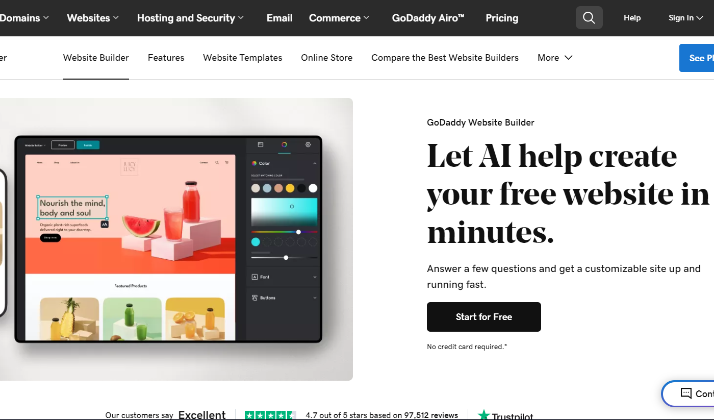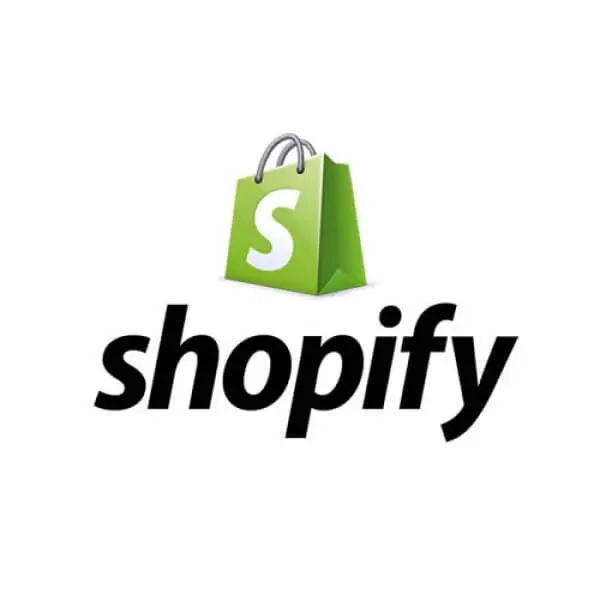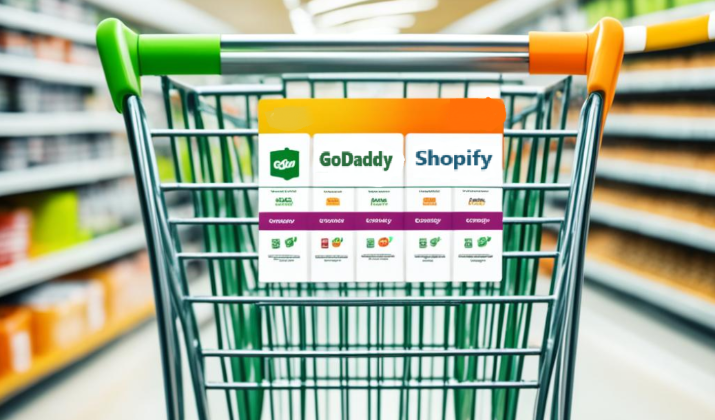Are you struggling to decide between GoDaddy and Shopify as the platform to build your online ecommerce business or website?
As the owner of a small business, it’s a critical decision that can impact the success of your web design and online store.
Both platforms offer unique features and capabilities, but which one is the better fit for your needs?
In this comprehensive guide, we’ll explore the key differences between GoDaddy and Shopify. By the end, you’ll have a clear understanding of which platform is the best choice to help your online business thrive.
Let’s begin.
Overview
GoDaddy

Originally, GoDaddy offered domain registration, and web hosting services but over time, it expanded its portfolio offering website builders, ecommerce solutions, SSL certificates, professional business email, and more.
It is known as the world’s most popular domain registrar and web hosting company, with services ranging from shared hosting to dedicated, VPS, and reseller hosting plan.
GoDaddy’s popular website builder, offers an easy-to-use platform for creating professional-looking websites, even for those with no prior experience.
Some key features of GoDaddy’s website builder includes:
- Drag-and-drop interface that makes it hard to mess up the website design
- Automatic optimization to ensure the website looks great on any device
- Hundreds of customizable templates for various types of websites
- Ability to create a basic website for free, with options to upgrade for more features
- Built-in tools for online marketing, ecommerce, and more
- Responsive mobile design and SSL security included
While the website builder has some limitations compared to building a site from scratch, it provides a powerful yet simple solution for quickly creating a working website.
Also read: Ecwid vs Squarespace
Shopify
Shopify is a Canadian ecommerce company that provides a platform for businesses to create online stores and sell their products.
It offers a subscription-based software as a service (SaaS) model that allows merchants to set up and manage their online stores with minimal technical knowledge.
Some notable features of Shopify include:
- Easy-to-use tools for creating and customizing online stores
- Ability to sell across multiple channels, including online, mobile, social media, and in-person
- Integrated payment processing and secure checkout options
- Inventory management, shipping, and customer engagement tools
- Reporting and analytics to track sales and marketing performance
Shopify is designed to be user-friendly for businesses of all sizes, from small startups to large enterprises.
Check out: ClickFunnels vs Shopify
Try Shopify free followed by first month at just $1. No credit card required. Limited Time Offer.
Ease of Use
When it comes to ease of use, both GoDaddy and Shopify offer user-friendly platforms, but they take different approaches.
GoDaddy
GoDaddy’s website building software is highly user-friendly, making it an excellent choice for beginners venturing into website creation for the first time.
The platform’s ease of use is highlighted by its intuitive navigation, AI website builder, and quick setup time, making it ideal for users with limited time to invest in the website development process.
The platform’s Artificial Design Intelligence (ADI) feature can automatically generate a website based on your business information, streamlining the process for those who want to get online quickly.
However, GoDaddy may not be suitable for users prioritizing mobile compatibility or seeking extensive creative control over their website design.
Additionally, GoDaddy’s focus on business and online store websites makes it a good option for small businesses.
Overall, GoDaddy’s emphasis on simplicity and efficiency positions it as a top choice for even novice users to create a professional-looking website.
Explore: Ecwid vs Shopify
Shopify
Shopify, on the other hand, provides a more robust and customizable website building experience.
Shopify themes, like the Warehouse theme, are designed to be user-friendly, offering features like EU translations, color swatches, quick view, stock counters, and in-menu promos.
These themes are developed with high-quality code for fast performance and are regularly updated to work seamlessly with Shopify’s evolving features.
Moreover, Shopify allows for easy product page creation by providing a step-by-step process within the Shopify admin, enabling users to add or update product information efficiently.
Additionally, Shopify provides guidelines for creating compelling product pages, emphasizing the importance of high-quality images, visible pricing, concise descriptions, sand a simplified add-to-cart process.
While it may have a slightly steeper learning curve than GoDaddy, Shopify’s extensive selection of themes and design tools allow you to create a highly personalized website that reflects your brand.
Ultimately, the ease of use and website building experience will depend on your technical expertise and the specific needs of your business.
If you prioritize simplicity and a quick setup, GoDaddy may be the better option. However, if you’re looking for more design flexibility and robust ecommerce capabilities, Shopify may be the more suitable choice.
Read this too: Hostinger vs Shopify
Ecommerce Functionality
Shopify clearly outshines GoDaddy in this area.
Shopify
As a platform built specifically for ecommerce, Shopify offers a comprehensive suite of tools and features to help businesses manage and grow their online stores.
With Shopify, you’ll have access to a robust inventory management system, allowing you to easily track your products, manage stock levels, and fulfill orders.
The platform also integrates seamlessly with a wide range of payment gateways, making it simple to accept payments from your customers.
One of Shopify’s standout features is its powerful ecommerce analytics, which provides valuable insights into your sales, customer behavior, and marketing performance.
Furthermore, Shopify offers advanced features such as abandoned cart recovery, customer segmentation, and powerful marketing tools to help you reach and engage your target audience.
Also read: Shopify vs Storyblok
Try Shopify free followed by first month at just $1. No credit card required. Limited Time Offer.
GoDaddy
Users can set up an online store using GoDaddy’s Website Builder or WordPress Websites. With these tools, users can customize their store, add products, set up payment options, manage inventory, and more.
Additionally, GoDaddy provides features like secure checkout, mobile optimization, and marketing tools to help businesses succeed online.
Users can also integrate popular payment gateways like PayPal and Stripe to accept payments.
Overall, GoDaddy’s ecommerce functionality aims to provide a user-friendly platform for individuals and businesses to create and manage their online stores efficiently.
Check out: Shopify vs Dukaan
Templates & Design
Both GoDaddy and Shopify offer the ability to create professional-looking websites, but with some notable differences.
GoDaddy
GoDaddy provides a vast library of mobile-responsive, customizable website templates, ranging from sleek, modern designs to more traditional layouts.
The templates typically come with built-in features and functionality like ecommerce, blogging, and SEO optimization.
These templates are easy to customize, allowing you to incorporate your branding, imagery, and content with minimal coding knowledge.
Explore: Sellfy vs Printful
Shopify
On the other hand, Shopify’s template selection is more extensive, with over 70 free and paid themes to choose from.
These templates are designed specifically for ecommerce, featuring a strong focus on product display, shopping cart functionality, and conversion optimization.
Shopify’s themes are also highly customizable, with the ability to modify the layout, colors, fonts, and other design elements to match your brand’s aesthetic.
One key advantage of Shopify’s templates is their mobile-optimization, ensuring your online store looks great on any device.
Additionally, Shopify offers advanced design tools, such as the ability to create custom page layouts, add sections, and integrate third-party apps to enhance the functionality and appearance of your website.
You might find this useful: Sellfy vs Etsy
Search Engine Optimization (SEO)
Both GoDaddy and Shopify offer built-in features to help your website rank higher in search engine results. However, the depth and sophistication of these tools differ between the two platforms.
GoDaddy
GoDaddy’s SEO tools are relatively straightforward, focusing on the basics like meta tags, alt text, and sitemaps. SEO functions in GoDaddy can vary depending on the specific services and tools offered by the platform.
Some of these SEO tools include:
- On-page SEO Optimization
- Keyword Research
- Local SEO
- Link Building
- Mobile-friendly Optimization
- Analytics and Tracking
While these features can help improve your website’s visibility, they may not provide the same level of advanced optimization as Shopify’s more robust SEO capabilities.
Explore: Sellfy Review, Pros And Cons
Shopify
Shopify is designed with a stronger emphasis on SEO. The platform offers a wide range of SEO-friendly features, including customizable page titles, meta descriptions, and URL structures.
Shopify also automatically generates XML sitemaps and provides detailed analytics to help you track your website’s performance in search engine results.
Additionally, Shopify’s SEO features are more flexible and allow for deeper customization, enabling you to fine-tune your optimization strategies.
This can be especially beneficial for businesses that require a more sophisticated approach to SEO, such as those with complex product catalogs or a need for advanced keyword targeting.
If you’re looking for a user-friendly platform with basic SEO tools, GoDaddy may be a suitable option.
However, if you require more advanced SEO capabilities to drive organic traffic and improve your online visibility, Shopify may be the better choice.
Read this too: Shopify vs Wix
Try Shopify free followed by first month at just $1. No credit card required. Limited Time Offer.
Payment Options
Although both GoDaddy and Shopify offer a range of payment options, there are some key differences to consider.
GoDaddy integrates with a variety of popular payment gateways, including PayPal, Stripe, and its own GoDaddy Payments solution.
The transaction fees associated with these payment options can vary, with GoDaddy Payments charging a flat rate of 2.9% + $0.30 per transaction.
Shopify, on the other hand, has its own built-in payment gateway called Shopify Payments, which is powered by Stripe.
This integration allows Shopify merchants to accept a wide range of payment methods, including credit cards, digital wallets, and alternative payment options.
The transaction fees for Shopify Payments start at 2.9% + $0.30 per transaction, but they can be reduced to as low as 2.4% + $0.30 for businesses on higher-tier Shopify plans.
Additionally, Shopify offers over 100 third-party payment gateway integrations, giving you the flexibility to choose the payment solution that best fits your business needs and preferences.
This level of payment gateway integration and customization may be particularly appealing for larger or more established online businesses with complex payment requirements.
Also read: Ecwid vs BigCommerce
Customer Support
When it comes to customer support, both GoDaddy and Shopify offer assistance, but the level and availability of help can vary between the two platforms.
GoDaddy provides 24/7 customer support via phone, email, and live chat, ensuring you can quickly get the answers you need, no matter the time of day.
Shopify, on the other hand, offers support through various channels, including email, chat, and a comprehensive knowledge base, but the availability and response times may not be as immediate as GoDaddy’s around-the-clock assistance.
If you value prompt and readily available customer support, GoDaddy’s 24/7 accessibility may be the better choice.
However, if you prefer a more self-service approach, with the ability to troubleshoot issues through a robust knowledge base, Shopify’s support resources may be more suitable for your needs.
Ultimately, the level of customer support you require will depend on your comfort with website management and the complexity of your online business operations.
Check out: Best Ecwid Alternatives
Conclusion
GoDaddy offers a comprehensive suite of services catering to domain registration, web hosting, and website building, making it a versatile option for beginners and small businesses.
Whereas Shopify is all about ecommerce, providing robust tools for online store creation, management, and growth.
Ultimately, the decision between GoDaddy and Shopify hinges on the nature of your business, your technical expertise, and your long-term objectives.
Pick the one that suits your needs.














